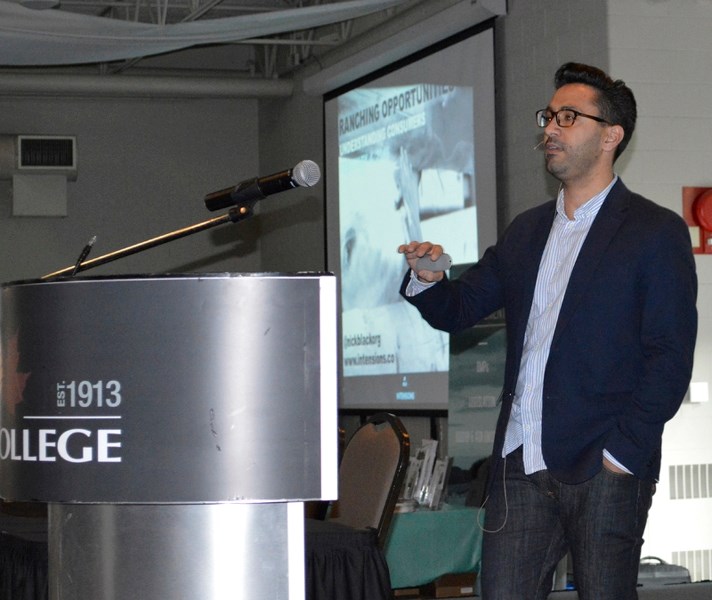Delegates at last week's 2016 Ranching Opportunities conference at Olds College were urged to stress the positives when promoting the agriculture industry to domestic and international customers.
Nick Black, the managing partner with Intentions Consulting, was one of the speakers at the one-day conference. He spoke about recent research into consumer attitudes about farm animal production, consumption and related issues.
“I think you need to start by working with the positives,” said Black. “It's very hard to go up against negative things, but what you can do is defend and continue to talk about the positives. These are your strengths. This is a huge opportunity for you guys to get involved and show them (consumers) what is going on.
“Take one of the myths and tackle them with honesty and transparency. Say, ‘we do care about the animal and we are following the best standard possible' and that is how you tackle these things.”
He called on Alberta farmers and ranchers to champion their industry with domestic and international customers.
One hundred and seventy people, including area producers and Olds College students and staff, attended the conference, which was held in the Alumni Centre and elsewhere on the college grounds on Feb. 4.
Black presented the findings of a recent survey of more than 700 Alberta residents aged between 15 and 69 in both rural and urban communities.
The survey found that on average 39 per cent of Alberta residents agree or strongly agree that they look for animal products that come from Alberta, and 34 per cent would pay more for animal products from Alberta.
Fifty-one per cent of women and 35 per cent of men respondents said the size of a farm animal's living space concerns them. Sixty-nine per cent of women and 57 per cent of men respondents said they believe raising farm animals in small or overcrowded spaces is highly unethical.
Thirty-nine per cent of respondents said they believed that superfarms (large industrial operations) are harmful for the animals' health and welfare, 33 per cent said they believed that animals in superfarms are treated unethically, and 24 per cent said they believe products produced in superfarms are a risk to human health.
Forty-eight per cent of women respondents and 28 per cent of male respondents said they believed that consuming meat from farm animals treated with hormones and/or antibiotics is harmful to human health.
The survey found that when looking for information on farm animal health and welfare, 81 per cent of Albertans use search engines, 51 per cent use newspapers, 37 per cent use television, 16 per cent use YouTube, 12 per cent use Facebook, five per cent use Twitter, and four per cent consult farmers in person.
Black offered three final thoughts (quoted):
• Nationally and globally, there are significant strengths and positive perceptions of the Canadian ranching industry, creating an underlying sense of trust and positivity.
• Locally, Alberta residents who are younger (15 to 29) and/or female have the strongest negative beliefs about ranching practices.
• Individuals should be encouraged to get involved in promoting the positivity and transparency of the ranching industry.
Other presenters at the Ranching Opportunities conference included Steven Kenyon, who spoke about low risk ranching; Curt Pate, who gave a cattle handling demonstration; Brad McLeod, the program manger at the National Meat Training Centre at Olds College, who spoke about beef grading; and Ben Wilson, who spoke about the FarmOn online community of more than 15,000 people “passionate about building a better future for the next generation of farmers.”
A four-person panel spoke about winter grazing: Sean LaBrie from Difficulty Ranch spoke about bale grazing, Greg Selzler from Eagle Hill Farms spoke about swath grazing and Glen Stankievech from Stankievech Ranch spoke about corn grazing.
Forage and livestock business specialist Grant Lastiwka from Alberta Agriculture in Olds was also on the panel.
The 10th annual conference was co-sponsored by Kneehill County, Mountain View County, the MD of Bighorn, the Foothills Forage and Grazing Association, Wheatland County, Rocky View County, Red Deer County, Olds College, Alberta Agriculture and Forestry, Alberta Livestock and Meat Agency Ltd, UFA, Dow, Dow AgroSciences and Lone Star Ranch and Sales.



